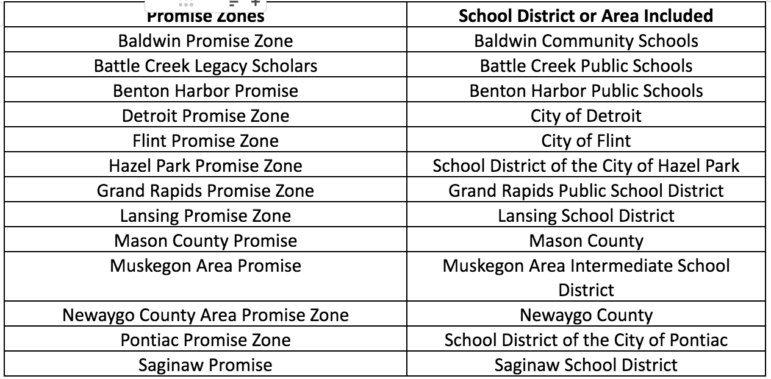
Michigan Promise Zones Association
The 13 districts currently with Promise ZonesBy KENZIE TERPSTRA
Capital News Service
LANSING — Students in 13 communities known as Promise Zones would be able to receive more financial aid to assist with on-campus housing and meal plans at public community colleges and four-year institutions under a legislative proposal.
They include Detroit, Baldwin, Mason County, Lansing, Grand Rapids, Hazel Park, Newaygo County and Pontiac.
Promise Zones are “communities designated through state law to make scholarships available to all students in a locality,” according to the Michigan Promise Zones Association.
These scholarships are provided to all students who live in and graduate from a high school in such a zone.
Students who seek Promise Zone scholarships must first submit a Free Application for Federal Student Aid which determines their eligibility for need-based assistance.
Once a student’s total need-based grants are determined, those eligible will receive a Promise Zone scholarship to cover the remaining cost of tuition and mandatory fees to earn at least an associate’s degree.
Participating communities can also choose to provide scholarships for bachelor’s degree programs.
A pending bill would allow on-campus room and board at educational institutions to count as “qualified educational expenses” if they are included in a Promise Zone’s development plan.
The legislation was introduced by Sen. Rosemary Bayer, D-Keego Harbor, and is currently in the Senate Appropriations Committee.
“The idea is that students and Promise Zone boards should have the opportunity to use some of that money to help pay for on-campus housing,” Bayer said at a recent committee meeting.
Additional sponsors include Democratic Sens. Sarah Anthony of Lansing, Darrin Camilleri of Trenton, Kristen McDonald Rivet of Bay City and Paul Wojno of Warren.
Bayer said students in Promise Zones often have family circumstances that make it difficult to succeed in their post-secondary education pursuits.
“The data is really stark about the growing needs and the financial burden of things beyond tuition and fees,” said Jamie Jacobs, the deputy director of the Michigan College Access Network. The organization helps students get access to and earn college certificates and degrees.
Jacobs said that before the COVID-19 pandemic, 46% of community college students surveyed reported experiencing housing insecurity.
“This bill, if it were passed, would provide Promise Zones with the flexibility to consider providing financial support to cover additional costs like housing,” Jacobs said.
According to Jacobs, the flexibility of providing support for other costs could increase the graduation rate of program participants.
“The need for students to complete their programs is very high in order to retain talent and meet labor market demands,” Jacobs said.
Promise Zone authorities, the 11-member governing body of each zone, solicit private donations to fund their scholarships.
Beginning in the third year of operation, authorities may qualify for state funds through tax increment financing, or “tax capture.” That lets authorities use half the increase in the state education tax collected in their zone to help pay for scholarships, according to the association.
The legislation would not affect or require state funding, but would allow Promise Zone communities the option of providing additional assistance.
Current law allows a maximum of 15 zones. Beginning Oct. 16, the Department of Treasury will accept applications for the two available slots.
Eligible are cities, townships, counties, local schools districts and intermediate school districts with a minimum percentage of families who live at or below the federal poverty level.